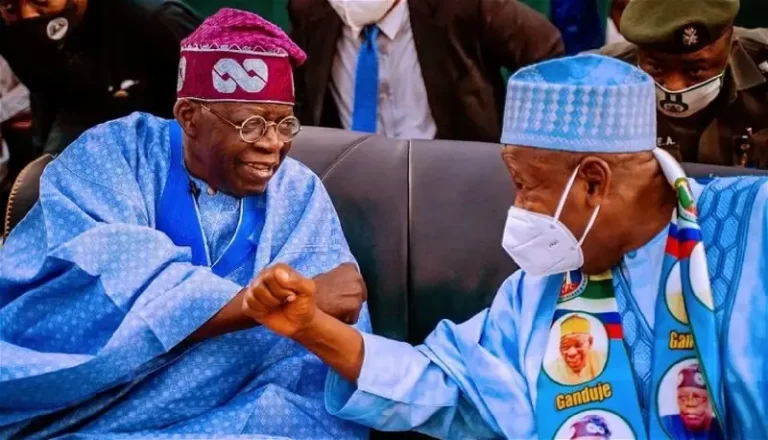The resignation of Dr. Abdullahi Umar Ganduje as National Chairman of the All Progressives Congress (APC) has triggered a storm of political intrigue, regional demands, and internal power recalibration within Nigeria’s ruling party. While the party publicly attributes Ganduje’s decision to step down to health reasons, insiders and political watchers are convinced that deeper, strategic motives are at play—chief among them, the 2027 presidential race and the possible realignment of key northern political figures.
Ganduje, a former governor of Kano State, formally resigned on Friday, a development confirmed by the APC’s National Publicity Secretary, Felix Morka. Yet, there was no formal resignation letter in circulation, and reports revealed that Ganduje had discreetly removed his personal belongings from his office a day earlier. His resignation came less than a year after he assumed office in August 2023, following the resignation of Senator Abdullahi Adamu.
Though the party quickly announced Deputy National Chairman (North), Hon. Bukar Dalori, as Acting National Chairman, the leadership vacuum has exposed ongoing tensions over zoning, internal party calculations, and President Bola Ahmed Tinubu’s long-term political strategy.
Zoning Disputes and North Central’s Agitation
One of the most immediate flashpoints is the demand from the North Central region for the APC to return the national chairmanship to its rightful geopolitical zone. The position had been originally zoned to the North Central but was handed to Ganduje from the North West following Adamu’s resignation.
The North-Central APC Forum, led by Saleh Zazzaga, renewed its calls for fairness and equity. In a statement issued Saturday in Abuja, the group said the region deserved to complete the tenure of Adamu. “Now that Ganduje has decided to step aside, it is only fair and just for the party to finally allow the North-Central to produce the national chairman, ensuring fairness, justice, and equity,” the forum stated.
This sentiment is echoed by several party stakeholders who argue that the region made significant electoral contributions to Tinubu’s victory in 2023. The North Central gave Tinubu over 1.7 million votes, compared to Peter Obi’s 1.4 million and Atiku Abubaka

Ganduje’s departure, however, seems to align with broader political maneuvering aimed at shaping the party’s leadership ahead of 2027. Multiple sources confirm that President Tinubu has concluded discussions with Ganduje’s long-time rival, Senator Rabiu Musa Kwankwaso, over a potential defection to the APC.
The Ganduje-Kwankwaso rivalry is well documented in Kano politics, and it was no secret that Kwankwaso could not consider rejoining the APC under Ganduje’s leadership. By removing this barrier, Tinubu appears to be setting the stage for a political realignment that may have significant implications not only in Kano but across the North.
The timing of Ganduje’s resignation has thus raised eyebrows. Many believe it was less about health and more about accommodating new political interests in a bid to strengthen APC’s base in key northern states ahead of 2027. A source at the APC headquarters put it plainly: “Monday’s National Working Committee meeting will give way to a National Executive Council meeting where the final decision on the chairmanship and other political calculations for 2027 will be made.”
Mixed Reactions Among Party Loyalists
In Ganduje’s home state of Kano, the resignation has not gone down well with his supporters. Many described it as a risky move that could unsettle the party in the state.
Sulaiman Ibrahim, a known Ganduje loyalist, said, “Ganduje’s exit as APC National Chairman is disappointing, especially given the progress he made in attracting opposition members back to the party. It feels like a setback.”
Another supporter, Usman Garba, cautioned against putting faith in Kwankwaso, warning that “Kwankwaso should never be trusted again because history repeats itself. He betrayed Goodluck Jonathan and also Buhari. It’s risky to build your party around someone like that.”
Some see the move as a political sacrifice meant to preserve the party’s future. Umar Idris, a party member in Kano, believes it might be a strategy to “replace Kashim Shettima with Kwankwaso” as vice president ahead of 2027. A former senior adviser to Ganduje, Faizu Alfindiki, described the resignation as “both historic and deeply personal.”

Tanko Al-Makura and the CPC Bloc
As the party searches for a substantive chairman, one of the names making the rounds is Senator Tanko Al-Makura, former governor of Nasarawa State and a key figure in the legacy Congress for Progressive Change (CPC) bloc of the APC. Reports suggest Tinubu is considering appeasing the CPC faction, which had threatened to exit the party if not given adequate representation.
But Al-Makura’s chances are complicated by his distant relationship with the President. A source close to the Villa stated, “The President is not close to him, and they hardly have any relationship. Tinubu won’t hand over party control to someone he doesn’t trust.”
Despite this, Al-Makura enjoys some grassroots support. In Gombe State, the Coalition of Progressive Movement endorsed him, citing his loyalty, competence, and broad appeal. “Al-Makura is a tested and trusted figure whose loyalty to the APC and its ideals is unwavering,” said the group’s coordinator, Umar Kumo.
APC Governors Endorse Resignation
The Progressive Governors Forum (PGF), which met in Benin, Edo State, over the weekend, took a more diplomatic tone. They described Ganduje’s resignation as part of the party’s “continued evolution,” and praised the growing unity within APC, citing recent defections of governors and lawmakers into the party.
What Next?
With a key meeting of the National Working Committee set for Monday, all eyes are now on what direction the APC will take. Will it return the chairmanship to the North Central in line with zoning principles? Will it accommodate the CPC bloc or fully embrace Kwankwaso’s rumored defection?




